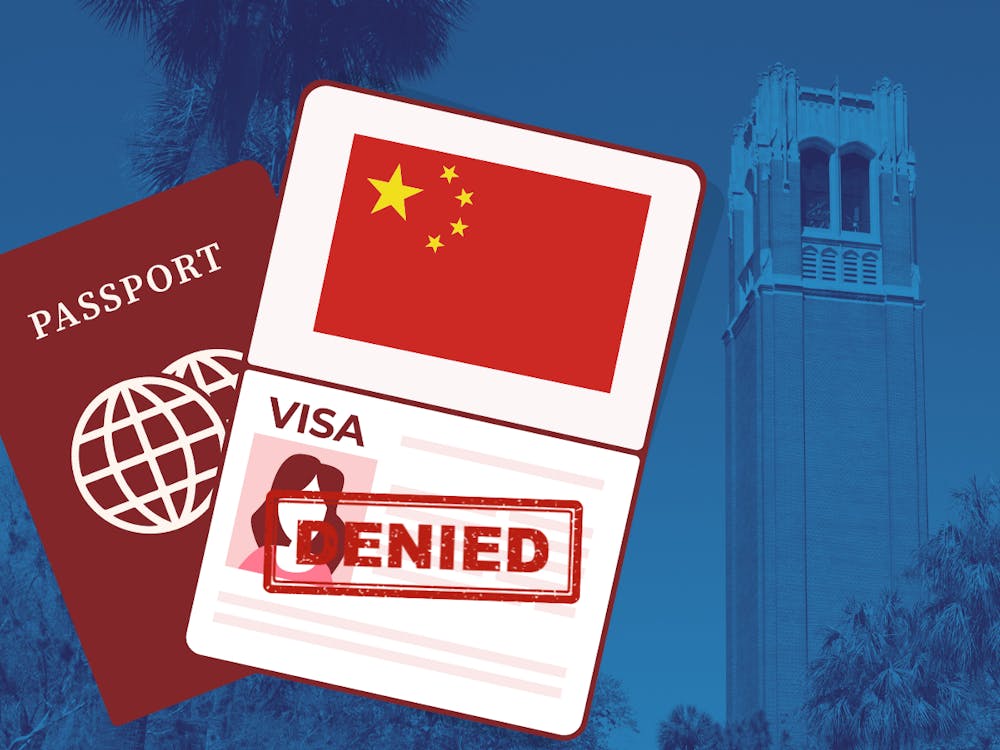Amid a tariff war between the U.S. and China, international students who traveled overseas in pursuit of education find themselves stuck in the middle.
The U.S. will start "aggressively" revoking Chinese student visas, Secretary of State Marco Rubio said in a May 28 press statement, "including those with connections to the Chinese Communist Party or studying in critical fields."
What qualifies as a "critical field" and what qualifies as a connection to the CCP is unclear.
Students weigh in
A UF Chinese international student studying chemistry, who spoke on the condition of anonymity for fear of jeopardizing her student visa, is worried about what this means for her future.
She said losing her student visa wouldn’t have been as bad if she just started her degree or was in the middle of it, which would allow her to apply for another school. But as she starts her last year of graduate school, it would make it harder to transfer or start over elsewhere.
"I feel a little bit worried because I'm about to finish," she said.
It’s not easy to become a member of the CCP, she said, and you have to go through a long process to gain that status. Even though she doesn’t fit the criteria, she’s worried about her student visa being revoked.
"It seems like [the government] doesn't care what you say," she said. "They don't care really who you are. I don't think the truth matters."
There are a lot of Chinese students in her department and other STEM programs at UF.
Universities will lose a large, qualified workforce in science and research if Chinese student visas are revoked, she said.
Chinese students, the largest group of international students at UF, made up 24.1% of its international student population in 2022. They also make up the second-largest group of international students in the country, behind India, with 277,398 Chinese students attending U.S. universities in the 2023-2024 school year.
Joaquin Rafaele Marcelino, a 20-year-old UF biochemistry, political science and Chinese senior, said universities are going to miss out on Chinese students’ contributions if the U.S. starts revoking their visas.
"Everybody deserves a chance at a higher education and to be part of our community and civil society," Marcelino said.
The visa revocation announcement follows a tirade of anti-immigrant policies in a trend they said is unlawful and goes against due process.
Florida has a history of targeting Chinese students. In December 2023, Senate Bill 846 banned "partnerships," including recruitment programs, between state universities and any non-U.S. citizen living in a foreign country of concern, including China. It sparked a protest at UF last year as students, faculty and advocacy groups spoke against the bill.
Christian Joven Garcia, a 20-year-old UF biomedical engineering junior, knows people who could be at risk from this mandate. It would set a dangerous precedent for how the federal government can impact students’ futures, he said.
"The risk of having people within my personal circle just disappear like that because of some government mandate scares me," Garcia said.
The U.S. and China have been in a tariff war since February 2025, when the U.S. announced tariffs on Canada, Mexico and China. Tensions rose May 30 when President Donald Trump accused China of violating a trade agreement with the U.S. weeks after the countries agreed to a temporary easing of tariffs imposed on each other.
Revoking Chinese students’ visas over trade conflicts is sacrificing their young livelihoods at the expense of a stick-poking fight between these two global superpowers, Garcia said.
"Using these students as pawns in that is wrong," he said.
A history of exclusive policies
Joanna YangQing Derman, the director of anti-racial profiling, national security and civil rights at Asian Americans Advocating Justice – Asian American Justice Center, said she’s worried this mandate will create an environment of fear and uncertainty for the Asian American community.
Targeting Chinese students can lead to racial profiling, she said. Not everyone can distinguish a stranger’s nationality and ethnicity, which could lead to people treating anyone in the Asian American community with suspicion because of the government’s actions toward one specific ethnicity.
Revoking Chinese student visas would be incredibly harmful because it paints them as a threat, she said.
" It would act as a blunt instrument versus a scalpel when we're talking about how to responsibly address national security concerns," Derman said.
There’s a historical pattern of exclusionary policies toward the Asian American community. Events like the Chinese Exclusion Act of 1882 and Japanese American incarceration during World War II are precedents of dangerous law and rhetoric that heavily impacted the community, she said.
Other laws have been more inclusionary, like the Chinese Student Protection Act of 1992, which paved the way for Chinese students to get legal permanent status in the U.S.
Haipei Shue, the president of United Chinese Americans, a Chinese American civic organization, played a leadership role in passing the Chinese Student Protection bill. Thirty years later, it feels like Chinese students are in a more dire situation, he said.
"I almost feel like we need a new Chinese student protection bill," Shue said.
Thousands of Chinese students' lives will be impacted by having their visas revoked or not issued in the first place, he said.
"We [Chinese citizens] have turned in the last 30 years from assets to a huge liability today, which is not fair for the Chinese students here and not fair for our two countries," Shue said.
Having Chinese students come to study in the U.S. has built a bridge between the two countries. It has had a positive impact over the past century and has been one of the biggest diplomatic assets the U.S. has, he said.
"We're now going to give that up?" Shue said. "I don’t understand."
Concerns about due process
Robert Jacobs, a Gainesville immigration lawyer, expects the administration’s visa policy will face legal challenges and be temporarily halted.
President Trump wants to deport one million people this year, and this is a way to help him do it, Jacobs said. But the mandate is still shocking to him.
" I don't see how you could just pick out a nationality and say, 'You can't come into the United States,'" Jacobs said.
It is currently unclear how the administration plans to implement these changes, further adding to the confusion.
Jacobs said the government would have to find a way to justify denying Chinese students’ education in "critical fields."
"Trump's playing with fire," he said. "He is challenging the judicial system and claiming that, as president, he has more power than the law actually gives him."
Troy Nader Moslemi, a Florida Bar-certified immigration attorney based in Flushing, New York, said the mandate will result in students’ visas getting canceled even though they aren’t dangerous.
It’s going to be hard to get evidence of students being affiliated with the CCP, and it’s likely the government will revoke visas based on suspicion alone, he said.
"I don't know what the heck the evidence is going to be of CCP membership," Moslemi said. "Nobody frames a certificate on their wall saying, 'I'm in the CCP.' It doesn't happen."
CCP membership is very exclusive, and it’s unlikely a Chinese student would be a member, he said. Nevertheless, there are roughly 99 million CCP members, and the definition can be far-stretched if it doesn’t clarify how connected a student needs to be.
Targeting students for CCP connections and studying certain fields is another way of trying to meet deportation quotas, Moselmi said. Deportations require court cases and evidence, so this opens the door to targeting more people.
"I don't think it's going to be implemented accurately," he said. "I think [Trump’s] just going to start canceling visas."
There is an immigration court and an appeal process, he said, and thinking someone can get deported without a trial is like thinking someone who gets arrested goes straight to prison.
"You can't just pick people up off the street like they're spilled potato chips," he said.
Contact Maria Avlonitis at mavlonitis@alligator.org. Follow her on X @MariaAvlonitis.

Maria is the Fall 2025 university editor of the Alligator. She previously worked as the university administration reporter Summer 2025. Maria enjoys walking her dog, and on the rare occassion she has free time, she loves attempting to garden and salsa dancing.






